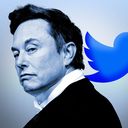At Elon Musk's Twitter, speech is anything but free

A series of changes at Twitter has laid bare what the service has become under Elon Musk: a place where speech is anything but free.
What's happening: From its shift to pay-for-play to impulsive policy changes made by Musk, the site more resembles an intrigue-filled palace than the town square that Musk says he seeks to protect.
Driving the news: Three recent developments reveal, in sharp contrast, just how much Twitter has changed in the five months Musk has owned the company.
Pay for play "verification"
April 1 marked the official deadline for previously verified Twitter users to pay for Twitter Blue to keep their blue check marks.
- Although most previously verified accounts have yet to lose the mark, the system has already begun to break down, with many celebrities and news organizations vowing not to pay.
- Among those who have said they won't pay are celebrities such as LeBron James and news organizations including The New York Times, The Washington Post and The Los Angeles Times. The White House is also not willing to pay, as Sara Fischer first reported on Friday.
- The New York Times apparently lost its check mark after saying it wouldn't pay, per the Washington Post.
- In general, removing legacy verifications may take Twitter a while, as insiders say removing them is a manual process — no one planned for a need for mass deletion.
Twitter's recommendation engine
Twitter's Friday release of some of the code that it uses to choose and rank content in the "For You" section provided readers with some new surprises.
- Twitter identifies certain accounts as Democrat or Republican. Per Mashable, developers said this was so Twitter could track whether algorithm changes were affecting one party disproportionately. But such tracking also opens the door to potential abuses.
- Musk's account, meanwhile, also has his own special category in the code, which could explain why many users have reported seeing his messages so prominently.
- The open-sourcing of the engine also revealed other mechanics at play, including how the service boosts content with images, downranks certain content with external links and increases distribution based on engagement criteria such as likes, retweets and replies, while limiting content that results in blocks and other negative engagement.
- There are other examples of the company putting its thumb on the scale. Tweets about Ukraine, for example, are said to be down-ranked.
Topics Musk doesn't want talked about
Separate from the algorithm, many users noted that there are a series of words that Twitter seems to want people not to use.
- If you use the words "trans" or "transgender" in a tweet, for example, the message won't preview if you share it via direct message on Twitter. (This was documented by others and I also experienced it while trying to share this post I wrote for transgender day of visibility.)
- Other terms said to be on the list are "bisexual," "gay," "lesbian" and "queer."
- While not an outright ban or even a "shadow ban," the move has the effect of making it harder for people to have a free conversation.
What they're saying: Twitter's response to e-mailed questions remains an autoreply with a poop emoji.
Between the lines: A number of soon-to-be-unverified users decided to go out with a bang, changing their display name and image to impersonate someone else.
- Lawfare blogger Ben Wittes turned his account into "Russian Embassy on Twitter" and started posting pro-Ukraine content, while others pretended to be everyone from Ted Cruz to J.K. Rowling apologizing for past actions.
- "I think it's fascinating that the sickest burn at the moment is impersonating a mean person and tweeting something kind," Pixar film director Angus McLane wrote in a tweet.